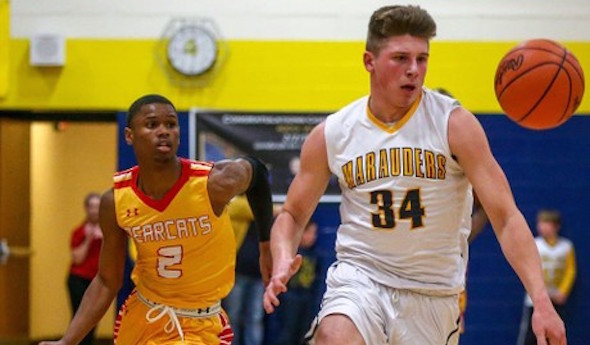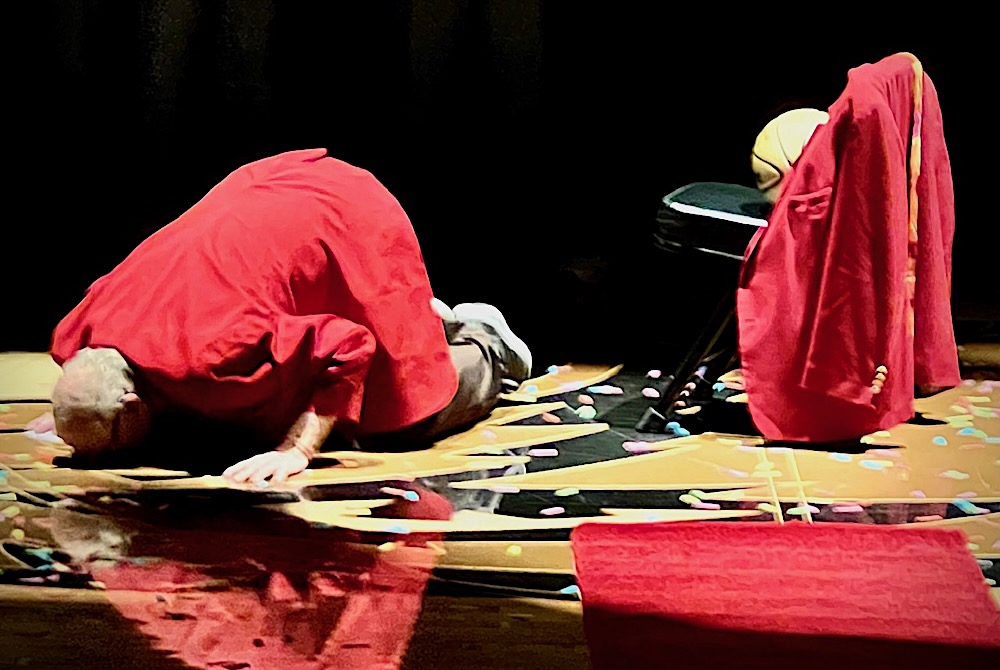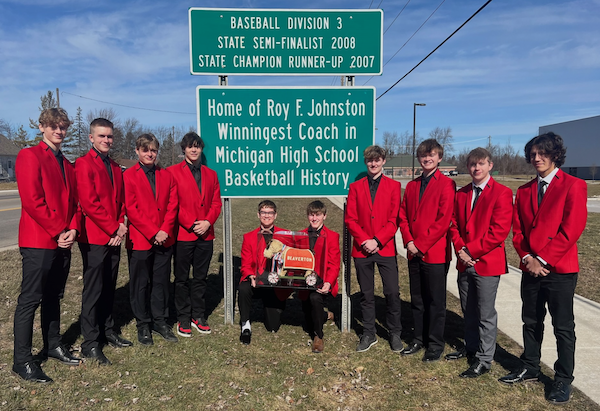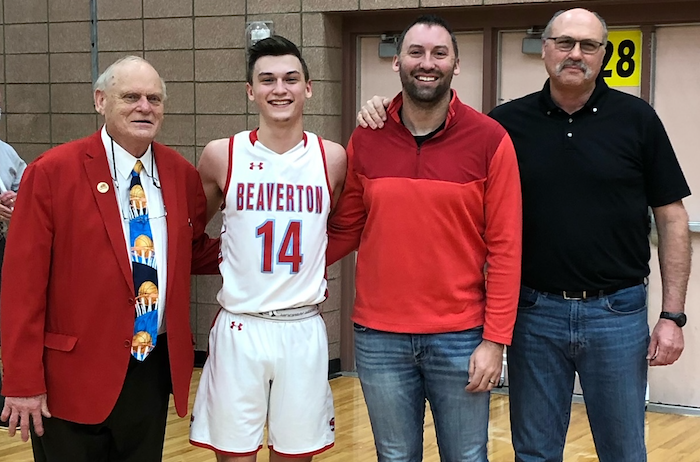
Broken Wrist Doesn't Break Season
March 29, 2018
By Geoff Kimmerly
Second Half editor
Never has a basketball player looked forward this much to shooting an airball.
 That’s what Carson Vincent is expecting two months from now, when he gets to fire with his right hand again, just like he has most of his life – until breaking a bone in his right wrist during a 7 on 7 football drill at the end of last summer.
That’s what Carson Vincent is expecting two months from now, when he gets to fire with his right hand again, just like he has most of his life – until breaking a bone in his right wrist during a 7 on 7 football drill at the end of last summer.
It’s incredible how much would’ve been lost if the Ovid-Elsie senior hadn’t been unknowingly tough and uncommonly flexible.
Vincent played a full season of football not knowing how badly he’d injured his wrist. Once he learned of the break in late November, he decided to play on – learning to shoot with his left hand and finishing his career as the Marauders’ second-leading score all-time while leading them to their best season in 25 years.
And the 6-foot-5 forward saw a clear parallel in the shared team and individual successes.
“It’s the same answer for both,” Vincent said. “Individually I wasn’t doing it for me; I was doing it for the team. I knew they wanted me out there, my family wanted me to be out there, and I wanted to be part of everything.
“The reason the team did well is we all wanted each other to be successful, to win a championship, to see each other happy.”
Ovid-Elsie finished 18-5 this winter, first in the Tri-Valley Conference West and as a Class B District champion. The league title was the program’s first since 1984, and the District its first since 1994.
Individually, Vincent began the winter coming off an all-state season as a junior, when he averaged 17.7 points and eight rebounds per game and set a school record for field goal percentage at 60.8.
With only 20 percent mobility in his dominant right hand, he was forced to become ambidextrous. “Amazingly” – to agree with coach Josh Latz’ description – Vincent upped his scoring to 20.4 points per game, grabbed 7.7 rebounds and added 2.1 assists, a block and a steal per game – and broke his school record by making 62 percent of his shots from the floor.
Vincent learned to shoot free throws left handed and became a better ball handler as well. Despite being able to throw up only an occasional floater right-handed, he became the third 1,000-point scorer in school history and finished with 1,026 points, 441 rebounds, 86 blocks, 74 assists and 60 steals over a three-year varsity career.
“Carson's toughness and resiliency this season was incredible. To be able to accomplish the things he did individually, with the hand he was dealt is remarkable,” Latz said.
“His biggest growth was as a teammate with his unselfishness to put teammates and team success ahead of his health and well-being. That being said, the successes we had as a team were in direct correlation with Carson's leadership and the example of physical and mental toughness he set for us.”
Vincent knew exactly when he was injured. He caught a touchdown pass running backward during that 7 on 7 about a week before the start of practice at the end of summer, and he fell – catching himself by falling directly on the wrist.
 Despite some pain, he started football practice and did all the drills. A receiver and cornerback, he noticed when he dropped some passes he’d otherwise pull in – but he still helped the football team to a 7-3 playoff season.
Despite some pain, he started football practice and did all the drills. A receiver and cornerback, he noticed when he dropped some passes he’d otherwise pull in – but he still helped the football team to a 7-3 playoff season.
On the day of the basketball team’s preseason scrimmage, he had the wrist checked out by a doctor who helps out with the Marauders. Diagnosis: broken and shifted bones. But Vincent already had made it through football season and decided to put off surgery until he could no longer manage the pain. He played in the scrimmage that day, although he couldn’t bend the wrist. He tried taping for a while, but gave up on that quickly because it just didn’t feel right.
And the difficulties didn’t come just at practice. Writing was doable but made his arm tired. Eating, even out of a bowl with a spoon, was not as easy as it would seem. Driving was a challenge for a bit. Sometimes he couldn’t open a door. He couldn’t shake people’s hands.
“Sometimes I’d get down on myself. Sometimes it’s frustrating,” Vincent said. “Before I went to the doctor’s office, I knew something was wrong with it – I wasn’t numb to the fact. Once I got told, obviously it was upsetting. All the what-ifs happen – what happens if I fall on it, will I be able to play, what if the pain is too much one day? It was really sad, but I got through it. I took it one day at a time. I wasn’t thinking about a week from now. I just got through what I could.”
He did sit out some parts of practice. Latz would pull him out of games to be cautious, but Vincent would ask right back in. A few opponents knew because they were Vincent’s friends, but mostly the team kept the injury an internal secret.
The Marauders’ season ended in a Regional Semifinal loss to Bridgeport on March 12, and three days later Vincent had surgery that included inserting bone from elsewhere in his arm and putting in a screw to hold everything together.
He’s wearing a cast now, and will switch to a splint in four weeks. He’s missing his track team’s first three meets, but will return after spring break next week – he runs the 200, 400 and on the 800 and 1,600 relays.
He’s planning to play college basketball. He has Division III opportunities and could also play at the junior college level to start out. Wherever he ends up, he’ll bring a much more well-rounded game – a lot of good that came out of what could’ve been a sad situation.
“First of all, (even without hurting) my wrist, if someone would’ve asked me if my team would do this, I would’ve told them I honestly don’t know,” Vincent said. “That alone surprised me. … It’s all shocking to me, to be able to do as good as a team, and I was able to do good individually also.
“Before this I was good left-handed, but I easily could say right-handed I was better. Now, honestly, my left hand is better than my right hand. I’ve learned new moves, I can do right and left hand now. Obviously I wish I hadn’t broken my wrist. But there were a lot of benefits to my game. I’ll take the good things and move on from it.”
 Geoff Kimmerly joined the MHSAA as its Media & Content Coordinator in Sept. 2011 after 12 years as Prep Sports Editor of the Lansing State Journal. He has served as Editor of Second Half since its creation in Jan. 2012. Contact him at [email protected] with story ideas for the Barry, Eaton, Ingham, Livingston, Ionia, Clinton, Shiawassee, Gratiot, Isabella, Clare and Montcalm counties.
Geoff Kimmerly joined the MHSAA as its Media & Content Coordinator in Sept. 2011 after 12 years as Prep Sports Editor of the Lansing State Journal. He has served as Editor of Second Half since its creation in Jan. 2012. Contact him at [email protected] with story ideas for the Barry, Eaton, Ingham, Livingston, Ionia, Clinton, Shiawassee, Gratiot, Isabella, Clare and Montcalm counties.
PHOTOS: (Top) Carson Vincent chases down a loose ball against Bridgeport this season. (Middle) Vincent throws down a dunk against Ithaca. (Photos courtesy of the Ovid-Elsie boys basketball program.)

Johnston Retires as Winningest Coach, Much More to Beaverton Dream He Built
By
Paul Costanzo
Special for MHSAA.com
March 15, 2024
Before Roy Johnston left the court that bears his name for the final time as Beaverton head boys basketball coach on Feb. 23, 1,500-plus fans, family and current and former players had one more chant.
 It wasn’t the name of the coach they all adored after he wrapped up the winningest career in MHSAA basketball history. It wasn’t even the school song, or a slogan.
It wasn’t the name of the coach they all adored after he wrapped up the winningest career in MHSAA basketball history. It wasn’t even the school song, or a slogan.
With Johnston pumping a raised fist, the community chanted “Judy” to honor his wife, who could not be at the game or celebration as she was battling cancer.
It was a fitting tribute to the woman behind the coach who became more than the face of the community, and one last opportunity for those fans to say thank you to her for her own efforts and sacrifices in helping the Beaverton become something pulled straight from the movie screen – the small-town sports tale complete with the iconic coach in the lead role and generations of locals living their dedication by filling the stands for every game.
Judy Johnston passed away this past Saturday, a little more than two weeks after the ceremony that honored her husband. She was 81.
All interviews for this story were completed prior to her passing, but a common theme when talking about Johnston’s 50-year career and importance to Beaverton was that the entire family, specifically Judy, had played a big role.
“His family has put forth an incredible amount of effort into our community,” said former player Brent Mishler. “In basketball and in general.”
Family is at the center of Johnston and Beaverton’s immense success over his 50 years. Not only has he coached multiple generations of several Beaverton families – including three generations of Mishlers – but he’s coached his own children, and grandchildren.
Small town programs often rely on players who have grown up around them and together, and Beaverton has that in spades.
“It was a dream,” former player and Johnston’s co-coach, Shad Woodruff, said of having his son Layk play for Johnston. “I got to play for Roy and be part of all that Beaverton basketball is – it’s not just a sport around here. We have video of (Layk) dribbling a basketball in the gym literally before he could walk. He’s been the little guy that always looked up to (Roy’s grandsons) Spencer Johnston and Carter Johnston, so just to be a part of Beaverton basketball is special.
 “It’s like when your kid gets there, you’re giving your kid to the community for a while and saying, ‘Here you go.’ It’s amazing to watch your son out there, especially in a community like ours. Roy has created this thing with Beaverton basketball where every Friday night, it’s like church. Everybody’s there.”
“It’s like when your kid gets there, you’re giving your kid to the community for a while and saying, ‘Here you go.’ It’s amazing to watch your son out there, especially in a community like ours. Roy has created this thing with Beaverton basketball where every Friday night, it’s like church. Everybody’s there.”
The numbers behind Johnston’s career, which started in 1966 in Yale, are remarkable. He holds the MHSAA record for wins by a boys basketball coach at 833, the vast majority coming at Beaverton, the program he took over in 1974.
The Beavers won 21 conference titles, 17 District titles and five Regional titles during Johnston’s 50 years, adding a run to the MHSAA Semifinals in 1984.
Just six of Johnston’s seasons ended in records below .500, and in a fitting tribute to their coach, this year’s Beavers scratched and clawed their way to a five-game win streak at the end of the season to ensure his last wouldn’t be No. 7, finishing the year 12-12 with a loss to Beal City in the District Final.
Included in that streak was a 54-45 victory over rival Gladwin on the night Johnston was honored. The Beavers trailed by as many as nine during the second half before rallying to win, led by a 26-rebound performance from 6-foot, 1½-inch senior Reese Longstreth, who Woodruff called the epitome of a Beaverton basketball player.
“I’ve been fortunate to be around Roy for 40 years, and I’ve seen a lot of great wins, especially in that gym,” Woodruff said. “I can’t put anything above that one.”
Layk Woodruff made the final basket in the game, which will forever be the final basket made in Roy F. Johnston Gymnasium during the Johnston era.
“It was super emotional, I’d say, for a bunch of reasons,” Layk Woodruff said of the game. “We felt like it was our responsibility, we had to that game for Roy. It was a rivalry game, last home game of the year – there were a lot of emotions when that game ended. I didn’t even think about (hitting the final shot) until a couple days later. Now that I get to think about it, it’s pretty cool to say that was me. I’ll always remember that.”
One celebration led to another, as Johnston’s retirement ceremony followed the game. A tribute video created by Beaverton graduate Jason Brown, who owns a digital media company, and narrated by longtime Beaverton public address announcer Scott Govitz was played. Govitz admitted to getting choked up at times while recording the video.
“There were a couple times where I did more than one take,” he said.
Govitz was at the center of a massive effort to create the ceremony, with support from athletic director Will Gaudard, school staff and members of the community, including multiple businesses and organizations. Govitz had arranged for special lighting and video screens for the presentation. Special tickets were printed for the night – which also happened to be Beaverton’s Hall of Fame night. Following the video, a spotlight was shone on center court, where a single chair sat, one of Johnston’s vintage red blazers draped over its back.
The more than 100 former players who had come to celebrate their coach each had a glow stick they cracked on, and walked through the darkness to surround the chair.
Then Johnston walked the red carpet – much like his starters have for years when being introduced prior to games – and addressed the crowd.
He didn’t speak for long, but as Johnston so often does, he hit all the right notes, mixing gratitude with humor.
“Gladwin County is a great place to raise a good family,” Johnston said after thanking the traveling contingent from Gladwin.
“I want to thank everyone for a great run. Fifty years. A great run.”
For outsiders, it was a chance to see the softer side of Johnston rather than the man intensely patrolling the sidelines during games. It was a glimpse at the man that handed out suckers before games to every kid in attendance.
 “He belonged on an episode of ‘Grumpy Old Men,’ and he still could play the role,” Govitz said with a laugh. “He would always say, ‘Don’t listen to the way I say it, listen to what I say.’ He just wants you to do things correctly. His players, maybe they didn’t adore it at the time, but they adore it now. Being a part of that program taught them more than basketball skills. … What will happen, once they leave, they find that great respect for it. And, he does things quietly that no one ever knows or sees – helping someone in need, especially the ones in college, checking up on them or sending them some money. That helps build a program and build relationships. He said in his last speech that it’s about getting along with others. If you can’t get along well with others, you can’t get along. That’s what it’s about.”
“He belonged on an episode of ‘Grumpy Old Men,’ and he still could play the role,” Govitz said with a laugh. “He would always say, ‘Don’t listen to the way I say it, listen to what I say.’ He just wants you to do things correctly. His players, maybe they didn’t adore it at the time, but they adore it now. Being a part of that program taught them more than basketball skills. … What will happen, once they leave, they find that great respect for it. And, he does things quietly that no one ever knows or sees – helping someone in need, especially the ones in college, checking up on them or sending them some money. That helps build a program and build relationships. He said in his last speech that it’s about getting along with others. If you can’t get along well with others, you can’t get along. That’s what it’s about.”
Mishler echoed that sentiment, and some of the memories that stick out most to the 2002 graduate were when Johnston got after him in his own special way.
“Playing for him was a privilege,” said Mishler, whose father Steve played for Johnston in the ’70s, and his son Cameron played through 2021. “The life lessons he taught set you up for success in life for the future. ‘You need to hear what I’m saying, not the method I’m saying it.’ That’s so true. Being honest and having expectations, and expecting people to hit those expectations, is not a bad thing.”
After Johnston was done speaking, he knelt down and kissed the floor to say goodbye to the job he’s done for most of his life, and in a way, thank you, to the community he helped create and that he’ll now need more than ever.
“Roy’s good at making you feel like he’s not big on that stuff (being recognized), and he isn’t, but he definitely does appreciate it,” Shad Woodruff said. “He understands how important he is to the community, and that he’s done something really special. He understands what he’s done is a pretty big feat, but he doesn’t talk about it. He doesn’t brag about it.”
 Paul Costanzo served as a sportswriter at The Port Huron Times Herald from 2006-15, including three years as lead sportswriter, and prior to that as sports editor at the Hillsdale Daily News from 2005-06. He can be reached at [email protected] with story ideas for Genesee, Lapeer, St. Clair, Sanilac, Huron, Tuscola, Saginaw, Bay, Arenac, Midland and Gladwin counties.
Paul Costanzo served as a sportswriter at The Port Huron Times Herald from 2006-15, including three years as lead sportswriter, and prior to that as sports editor at the Hillsdale Daily News from 2005-06. He can be reached at [email protected] with story ideas for Genesee, Lapeer, St. Clair, Sanilac, Huron, Tuscola, Saginaw, Bay, Arenac, Midland and Gladwin counties.
PHOTOS (Top) Beaverton boys basketball coach Roy Johnston kisses the court that bears his name during a celebration of his retirement Feb. 23. (Middle) This season’s team stands at the entrance to town with signs announcing the program and coach’s successes. (Below) Johnston takes a photo with three generations of Mishlers – Cameron, Brent and Steve. (Top photo by Stephanie Johnston.)

